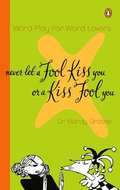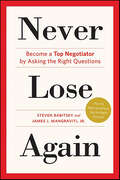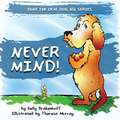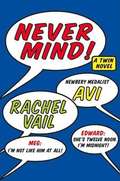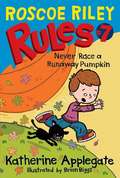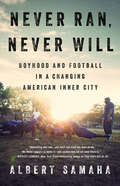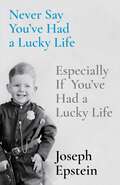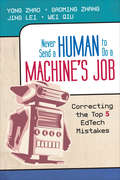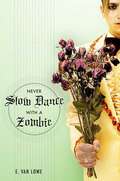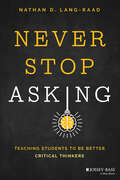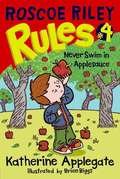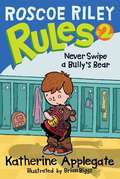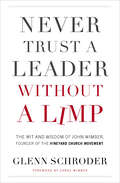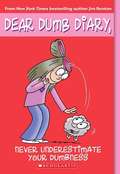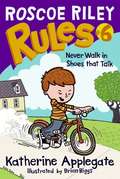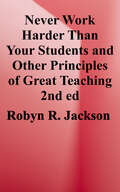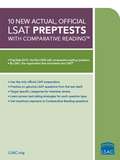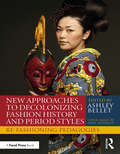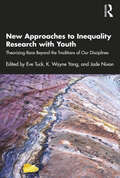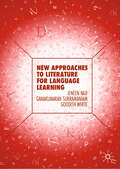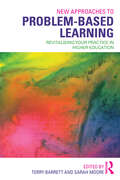- Table View
- List View
Never Let a Fool Kiss You or a Kiss Fool You
by Mardy GrotheWhat do Mae West, John F. Kennedy, Victor Hugo, and H. L. Mencken have in common? They all indulged in chiasmus-a literary device in which word order is reversed to hilarious or poignant effect. When Mae West said, "It's not the men in my life, it's the life in my men," she was using chiasmus; when John F. Kennedy said, "Ask not what your country can do for you, ask what you can do for your country," he was doing the same. Dr. Mardy Grothe has compiled hundreds of examples of chiasmus in this whimsically illustrated collection, bringing this witty and thought-provoking device out of obscurity and into the public imagination. "There is plenty of delight in this overdue collection. " (Houston Chronicle)
Never Lose Again: Become a Top Negotiator by Asking the Right Questions
by Steven Babitsky James J. Mangraviti Jr.The Most Practical Book on Negotiating Ever WrittenNegotiating is an art. It's complicated. To become an exceptional negotiator traditionally requires years of experience in negotiations. But that doesn't mean that most people can't quickly and easily learn proven negotiating skill and techniques if someone shows them what to do. This book does exactly that. Never Lose Again reveals a simple but remarkably effective set of fifty questions that anyone can immediately use to become far better negotiators. The fifty questions apply to all types of negotiation situations, from conflicts like buying a home or car to business transactions of all kinds. Each question has been designed to put you in the best position possible, helping you to avoid tricks, break deadlocks, discover conflict and dispute resolutions, and find hidden deals in all types of negotiations.No other book on the market distills the key negotiation principles into such a simply, effective, and instantly usable form. By learning to use these questions, you can start thinking like expert negotiators and make better deals for yourself, your family, and your business.
Never Mind (Duke the Deaf Dog ASL Series)
by Kelly BrakenhoffDuke the Deaf Dog doesn't like being told "never mind." Whether it happens at preschool or the park, both parents and children will relate to feeling left out when you aren't part of the action. A great way to teach children that everyone deserves to be included in conversations. <P><P><i>Advisory: This book offers only partial accessibility. We have kept it in the collection because it is useful for some of our members. Benetech is actively working on projects to improve accessibility issues such as these in the future.</i>
Never Mind!
by Avi Rachel VailEdward and Meg are like night and day, oil and water. Meg zigs while Edward zags. How could two such different people be twins? Well, they are, but they don't have to like it--or each other. Seventh grade means different schools for the pair: Brainy Meg's at ultracompetitive Fischer, while Charlton Street Alternative School is the place for freewheeling Edward. Oddly enough, it's just when Edward and Meg are finally out of each other's shadows that the trouble begins. Within just a week, Meg's aspirations for popularity, and a boyfriend,combine with Edward's devious planning, lack of singing ability, and top-secret soft spot to set off a showdown the likes of which twindom has never before seen. How is it, then, that this final showdown is so much fun? Could it be that Meg and Edward are more alike than they thought? Never mind. Read the book!
Never Race a Runaway Pumpkin (Roscoe Riley Rules #7)
by Katherine ApplegateRoscoe is determined to guess the weight of a giant pumpkin in order to win books for his school library and candy for himself, but is overwhelmed by superstitions, especially about a certain black kitten.
Never Ran, Never Will: Boyhood and Football in a Changing American Inner City
by Albert SamahaThis uplifting story of a boys' football team shines light on the under-appreciated virtues that can bloom in impoverished neighborhoods, even as nearby communities exclude them from economic progress.Never Ran, Never Will tells the story of the working-class, mostly black neighborhood of Brownsville, Brooklyn; its proud youth football team, the Mo Better Jaguars; and the young boys who are often at the center of both. Oomz, Gio, Hart, and their charismatic, vulnerable friends, come together on a dusty football field. All around them their community is threatened by violence, poverty, and the specter of losing their homes to gentrification. Their passionate, unpaid coaches teach hard lessons about surviving American life with little help from the outside world, cultivating in their players the perseverance and courage to make it.Football isn't everybody's ideal way to find the American dream, but for some kids it's the surest road there is. The Mo Better Jaguars team offers a refuge from the gang feuding that consumes much of the streets and a ticket to a better future in a country where football talent remains an exceptionally valuable commodity. If the team can make the regional championships, prestigious high schools and colleges might open their doors to the players.Never Ran, Never Will is a complex, humane story that reveals the changing world of an American inner city and a group of unforgettable boys in the middle of it all.
Never Say You've Had a Lucky Life: Especially If You've Had a Lucky Life
by Joseph EpsteinA rich and comic portrait of the radical changes in American life and the literary world over the last eighty years. An autobiography usually requires a justification. The great autobiographies—those by Benvenuto Cellini, Jean-Jacques Rousseau, Benjamin Franklin, and Henry Brooks Adams—were justified by their authors living in interesting times, harboring radically new ideas, or participating in great events. Joseph Epstein qualifies on none of these counts. His life has been quiet, lucky in numerous ways, and far from dramatic. But it has also been emblematic of the great changes in our country since World War II. He grew up in a petit-bourgeois, Midwestern milieu, and the city of Chicago looms large in his life. He drew a lucky ticket in the parent lottery and his was a happy boyhood spent on playgrounds and hanging around drug stores. At high school dances, he was the rhumba king and at drive-in movies he was never allowed to go as far with girls as he so ardently desired. At twenty-six, after two years in the army, he found himself married, the father or stepfather of four children, and living in New York on the meager salary of a magazine subeditor. He was ablaze with ambition and fettered by frustration. He broke out by moving to Little Rock, Arkansas, to direct the city&’s anti-poverty program at the height of the Civil Rights movement. His writing career blossomed, he began teaching at Northwestern University, and, for twenty-five years, edited one of great intellectual magazines. Never Say You&’ve Had a Lucky Life is an intimate look at one life steeped in radical change: from a traditionally moral culture to a therapeutic one, from an era when the extended family was strong to its current diminished status, from print to digital life featuring the war of pixel on print, and on. But for all the seriousness of Epstein&’s themes, this book is memorable for its comic point of view and the constant reminder of how unpredictable, various, and wondrously rich life can be.
Never Send a Human to Do a Machine's Job: Correcting the Top 5 EdTech Mistakes
by Yong Zhao Dr Gaoming Zhang Jing Lei Wei QiuDo what you do best and let technology do the rest Technology has transformed lives. Why then, has it not transformed education? What needs to change to ensure integration that empowers students and enhances teacher depth? Learn how to let technology cultivate student autonomy, creativity, and responsibility while focusing on lessons that hone higher-order and critical thinking skills. See technology as a complement rather than a replacement Embrace its creation potential over consumption Encourage personalized learning, autonomy, and creativity over outcomes Celebrate digital competence over curriculum improvement Focus on tech-pedagogy over product usage
Never Send a Human to Do a Machine's Job: Correcting the Top 5 EdTech Mistakes
by Yong Zhao Dr Gaoming Zhang Jing Lei Wei QiuDo what you do best and let technology do the rest Technology has transformed lives. Why then, has it not transformed education? What needs to change to ensure integration that empowers students and enhances teacher depth? Learn how to let technology cultivate student autonomy, creativity, and responsibility while focusing on lessons that hone higher-order and critical thinking skills. See technology as a complement rather than a replacement Embrace its creation potential over consumption Encourage personalized learning, autonomy, and creativity over outcomes Celebrate digital competence over curriculum improvement Focus on tech-pedagogy over product usage
Never Slow Dance with a Zombie
by E. Van Lowe"Romy and Michelle's High School Reunion" meets "Night of the Living Dead" in this laugh-out-loud debut YA novel by Emmy Award-nominated TV writer E. Van Lowe.
Never Stop Asking: Teaching Students to be Better Critical Thinkers
by Nathan D. Lang-RaadThe modern K-12 teacher's must-have guide to teach students how to ask questions, weigh the evidence, and think critically and independently Students and teachers alike face a dilemma: Why think deeply when we can just take a shortcut by googling something? Why read an article when we can learn from a social media headline? If, as educators, we want to encourage our students to value thoughtfulness and to embrace the effort it takes to reach deep understandings, we must model that behavior ourselves. In Never Stop Asking, author Dr. Nathan Lang-Raad shows K-12 teachers how human brains like to take mental shortcuts, known as heuristics, that allow the brain to save energy and perform more efficiently. These heuristics, however, can lead to illogical thinking, cognitive biases, and fallacies that can hinder critical thinking. Never Stop Asking: Teaching Students to be Better Critical Thinkers is the armor we need to defend ourselves and our students against the all-too-tempting shortcuts that the digital age has to offer, employing strategies to consistently and explicitly support teaching critical thinking and weaving it into the everyday landscape of your classroom. Let’s ensure that the students of today will be the skilled thinkers of tomorrow. Learn about common psychological shortcuts and biases that hinder students and teachers alike Discover the logic and the science behind critical thinking and why it leads to better outcomes Gain strategies to bring critical thinking into the classroom and help students build patience, discipline, and skill Acknowledge and embrace the digital age in your teaching—without falling victim to its downsidesThis is an engaging and important book for K-12 teachers and instructional coaches. Teacher training programs can also be enhanced by the practical wisdom and easy-to-implement strategies inside.
Never Swim in Applesauce
by Katherine Applegate Brian BiggsThe hilarious chapter book series about an accidental rule breaker from Katherine Applegate, Newbery Medal-winning and bestselling author of The One and Only Ivan and Crenshaw, returns with a fresh new cover from artist Brian Biggs and bonus material!Roscoe's first grade class is going on their first field trip ever to an apple orchard! It's so much fun picking apples and seeing how applesauce is made. Ms. Diz, his teacher, expects the class to be on their very best behavior. And Roscoe tries--he really does--but somehow he still manages to land in a very sticky situation.Roscoe and his comical misadventures will appeal to fans of Megan McDonald's Stink series, Nancy Krulik's George Brown, Class Clown series, and Dan Gutman's My Weirder School series. This repackaged edition includes Roscoe Riley's Time-Out Activities, featuring lists, games, and more.
Never Swipe a Bully's Bear (Roscoe Riley Rules #2)
by Katherine Applegate"I saw something," said Wyatt. "Is that a stuffed pig? Because stuffed animals are for loser babies." "It's not a stuffed animal!" I cried. "It's a ... a lunch bag." "You talk to your lunch?" Wyatt asked. "Only when it's bologna," I said. Includes an excerpt from Roscoe Riley rules #3, "Don't swap a sweater for a dog."
Never Trust a Leader Without a Limp: The Wit and Wisdom of John Wimber, Founder of the Vineyard Church Movement
by Glenn SchroderA Unique Life, a Gifted Calling, a Lasting LegacyJohn Wimber is not only revered as the founder of the Vineyard movement but is renowned for his unique ability to capture truth in pithy little phrases. This inspirational collection of memorable remarks, each placed in its historical context, offers astute observations on essential principles while also capturing and preserving the story and identity of a miraculous work of God.For those who witnessed the miracle firsthand and for an entire generation of young leaders who never met John or experienced his ministry, here is a unique restatement of the foundational tenets that launched an international community of more than twenty-four hundred churches in more than one hundred countries—a lasting legacy of spiritual insights that changed lives then and can change your life today.
Never Underestimate Your Dumbness (Dear Dumb Diary #7)
by Jim BentonThe wedding between Jamie's aunt and Angeline's uncle is nearing, and they will be joined together until death -- or a much-wished-for divorce. Now, three of Jamie's most dreaded nightmares are about to be combined into one unbearable event: * Very VERY poofy brown dresses, * Wedding clogs, * A lifetime of being related to Angeline, a.k.a. Blondewad. Jamie has just one word for this kind of horror: "AAAAAAAAAAAAAAAAAAAAAAAAAAAAAAAAH!"
Never Walk in Shoes That Talk (Roscoe Riley Rules #6)
by Katherine ApplegateHaving gotten a pair of hard-to-find Walkie Talkie shoes, Roscoe is suddenly popular and wants his best friend, Gus, to join the fun, but before Gus's parents will buy him new shoes, he must wear out his long-lasting sneakers.
Never Work Harder than Your Students and Other Principles of Great Teaching
by Robyn R. JacksonSome great teachers are born, but most are self-made. And the way to make yourself a great teacher is to learn to think and act like one. In this updated second edition of the best-selling Never Work Harder Than Your Students, Robyn R. Jackson reaffirms that every teacher can become a master teacher. The secret is not a specific strategy or technique, nor it is endless hours of prep time. It's developing a master teacher mindset-rigorously applying seven principles to your teaching until they become your automatic response: - Start where you students are. - Know where your students are going. - Expect to get your students there. - Support your students along the way. - Use feedback to help you and your students get better. - Focus on quality rather than quantity. - Never work harder than your students. In her conversational and candid style, Jackson explains the mastery principles and how to start using them to guide planning, instruction, assessment, and classroom management. She answers questions, shares stories from her own practice and work with other teachers, and provides all-new, empowering advice on navigating external evaluation. There's even a self-assessment to help you identify your current levels of mastery and take control of your own practice. Teaching is hard work, and great teaching means doing the right kind of hard work: the kind that pays off. Join tens of thousands of teachers around the world who have embarked on their journeys toward mastery. Discover for yourself the difference that Jackson's principles will make in your classroom and for your students.
New Actual, Official LSAT Preptests with Comparative Reading
by Law School Admission CouncilThis essential LSAT preparation tool encompasses PrepTest 52 (the September 2007 LSAT) through PrepTest 61 (the October 2010 LSAT).
New Adventures: A Harcourt Reading Program (Grade #3)
by HarcourtAn interactive set of short stories with exercises focusing on specific skills like, prefixes and suffixes, vocabulary, synonyms and antonyms etc.
New Approaches to Decolonizing Fashion History and Period Styles: Re-Fashioning Pedagogies
by Ashley BelletNew Approaches to Decolonizing Fashion History and Period Styles: Re-Fashioning Pedagogies offers a wide array of inclusive, global, practical approaches for teaching costume and fashion history. Costume designers, technicians, and historians have spent the last several years re-evaluating how they teach costume and fashion history, acknowledging the need to refocus the discourse to include a more global perspective. This book is a collection of pedagogical methods aimed to do just that, with an emphasis on easy reference, accessible activities, and rubrics, and containing a variety of ways to restructure the course. Each chapter offers a course description, syllabus calendar, course objectives, and learning outcomes, as well as sample activities from instructors across the country who have made major changes to their coursework. Using a combination of personal narratives, examples from their work, bibliographies of helpful texts, and student responses, contributors suggest a variety of ways to decolonize the traditionally Western-focused fashion history syllabus. This collection of pedagogical approaches is intended to support and inspire instructors teaching costume design, costume history, fashion history, period styles, and other aesthetic histories in the arts.
New Approaches to Decolonizing Fashion History and Period Styles: Re-Fashioning Pedagogies
by Ashley BelletNew Approaches to Decolonizing Fashion History and Period Styles: Re-Fashioning Pedagogies offers a wide array of inclusive, global, practical approaches for teaching costume and fashion history.Costume designers, technicians, and historians have spent the last several years re-evaluating how they teach costume and fashion history, acknowledging the need to refocus the discourse to include a more global perspective. This book is a collection of pedagogical methods aimed to do just that, with an emphasis on easy reference, accessible activities, and rubrics, and containing a variety of ways to restructure the course. Each chapter offers a course description, syllabus calendar, course objectives, and learning outcomes, as well as sample activities from instructors across the country who have made major changes to their coursework. Using a combination of personal narratives, examples from their work, bibliographies of helpful texts, and student responses, contributors suggest a variety of ways to decolonize the traditionally Western-focused fashion history syllabus.This collection of pedagogical approaches is intended to support and inspire instructors teaching costume design, costume history, fashion history, period styles, and other aesthetic histories in the arts.
New Approaches to Early Child Development
by Hillel Goelman Jayne Pivik Martin GuhnGoelman, Pivik, and Guhnaddress a number of critical questions on early child development. What exactly is involved in conducting "interdisciplinary research" on early child development? What are the theoretical models that guide such approaches and how is such research accomplished in actual practice? This book volume describes a five-year journey of inquiry and discovery and the research findings of medical, health, and social scientists which provides an opportunity for scholars and professionals to reflect on the implications of this research for social policy and practice. "
New Approaches to Inequality Research with Youth: Theorizing Race Beyond the Traditions of Our Disciplines
by Eve Tuck K. Wayne Yang Jade NixonThose engaging in research to reduce youth inequality know that robust and resonant theories are needed alongside strong methods to study racialization, racism, and the consequences of racial categorization. This edited volume shares contributors’ first-person narrations of some of the hard-fought learnings and challenges of breaking from the traditions of their disciplinary fields and finding new and reclaimed ways to think about race. Featuring contributors’ narrations of how they came to engage with compelling theories of Blackness, Indigeneity, and/or racialization, and how such theories inform the social science research they do with young people, this timely and consequential text tells a multi-disciplinary story about the careful reading and co-theorizing that is required to refuse universal theories of Blackness, Indigeneity, and racialization.
New Approaches to Literature for Language Learning
by Goodith White Jeneen Naji Ganakumaran SubramaniamThis book unpacks recent changes in the landscape of literature and language teaching, and aims to find new explanations for the altered relationships between readers and writers, the democratisation of authorship, and the emergence of new ways of using language. By examining topics as various as literature and technology, multimodality, and new Englishes, the authors take a fresh look at the use of literature as a tool in the teaching of English to second-language speakers. More than simply a way of teaching aesthetic and ethical values and rhetorical skills, they argue that literature can also be used to help students to critically evaluate assumptions about society, culture and power which underpin the production and reception of texts. The book relates theories of language acquisition and literary criticism to examples of literary texts from a wide range of global literature in English, and discusses new ways of engaging with it, such as transmedia story telling, book blogs and slam poetry. It will be of interest to language teachers and teacher trainers, and to students and scholars of applied linguistics, TESOL, and digital literacies.
New Approaches to Problem-based Learning: Revitalising Your Practice in Higher Education
by Sarah Moore Terry BarrettProblem-based learning (PBL) is a pedagogical approach that has the capacity to create vibrant and active learning environments in higher education. However, both experienced PBL practitioners and those new to PBL often find themselves looking for guidance on how to engage and energise a PBL curriculum. New Approaches to Problem-based Learning: Revitalising your Practice in Higher Education provides that guidance from a range of different, complementary perspectives. Leading practitioners in the field as well as new voices in PBL teaching and learning have collaborated to produce this text. Each chapter provides practical and experienced accounts of issues and ideas for PBL, as well as a strong theoretical and evidence base. Whether you are an experienced PBL practitioner, or new to the processes and principles of PBL, this book will help you to find ways of revitalising and enriching your practice and of enhancing the learning experience in a range of higher education contexts.
